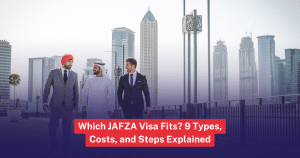UAE employment visa applications are on the rise, with over 200,000 issued in 2023 alone, according to gulfnews.com. This visa is your ticket to working legally in one of the world’s fastest-growing job markets. But what do you really need to know before applying? From eligibility to required documents, understanding the UAE employment visa can make your journey smoother. Ready to explore your options?
Table of contents
|
What Is a UAE Employment Visa?
A employment visa allows foreign professionals to live and work legally. An employer sponsors it and is typically valid for up to two years. This visa is essential for expatriates seeking job opportunities in the UAE’s growing economy.
To obtain a UAE employment visa, applicants must secure a valid job offer, pass medical tests, and meet immigration requirements. Once approved, visa holders can also sponsor family members for residency. The process involves multiple steps, including employer sponsorship and official approvals.
Understanding the visa application process helps avoid unnecessary delays and ensures a smooth transition to working legally in the UAE.
Who Can Apply for a UAE Employment Visa?
A UAE employment visa allows foreign professionals to legally live and work in the UAE. It is issued through employer sponsorship and is essential for expats seeking job opportunities. To qualify, applicants must meet specific immigration requirements. Understanding eligibility helps avoid delays and ensures a smooth application process.
Who Is Eligible for a UAE Employment Visa?
- Skilled Professionals: engineers, doctors, IT specialists, and finance experts with in-demand skills.
- Company-sponsored employees are individuals hired by UAE-based businesses and sponsored for work permits.
- Freelancers with Work Permits: Independent professionals registered under UAE-free zones or mainland authorities.
- Trade and Construction Workers: blue-collar employees recruited for manual labor, logistics, or technical jobs.
- Fresh Graduates with Job Offers: University graduates securing employment contracts in the UAE.
- Business Owners and Investors: entrepreneurs establishing companies and obtaining self-sponsored work visas.
- Government and Semi-Government Employees: professionals working in UAE government entities or public sector jobs.
- Specialized Talent in AI and Emerging Technologies Experts in fintech, blockchain, cybersecurity, and advanced industries.
A UAE employment visa requires a valid job contract, employer sponsorship, and a medical fitness test. If you are considering employment visa cancellation in the UAE, knowing the exit procedures ensures a hassle-free transition.
Why Do You Need a UAE Employment Visa?
Getting a UAE work visa throgh ica smart services is a good choice, for the reason that, it is mandatory for anyone planning to work in the UAE. It provides legal authorization, ensures compliance with labor laws, and grants access to essential benefits. Below are the key reasons why this visa is necessary for foreign workers.
10 Key Reasons You Need a UAE Employment Visa
- Legal Work Authorization: Required for all foreign employees to work legally in the UAE.
- Residency Permit: Grants you legal residency for the duration of your job contract.
- Employer Sponsorship: Links your work status to an authorized UAE employer.
- Labor Law Protection: Ensures fair wages, job security, and legal rights under UAE labor laws.
- Health Insurance Coverage: Mandatory for all employment visa holders to receive medical benefits.
- Access to Banking Services: Needed to open bank accounts, apply for loans and conduct financial transactions.
- Visa Renewal & Extension: Allows you to continue working without legal issues or penalties.
- Family Sponsorship Eligibility: Enables employees to sponsor dependents for residency in the UAE.
- Government Service Access: Required for applications such as driving licenses, tenancy agreements, and utility registrations.
- Easier Travel Within the GCC: Some professionals with valid UAE visas may get simplified entry to GCC countries.
A UAE employment visa is not just a requirement; it’s your legal pass to work, live, and enjoy the benefits of employment in the UAE. Without it, working in the country is not legally permitted.
General Steps to Get a UAE Work Visa
Getting a UAE employment visa is necessary for anyone planning to work legally in the UAE. The process includes multiple steps, such as employer sponsorship, medical checks, and government approvals. Below is a detailed breakdown of the required steps to obtain your work visa smoothly.
1. Job Offer & Contract Signing
Your employer provides a formal job offer with salary details, job responsibilities, and terms of employment.
2. Work Permit Application
Through the Ministry of Human Resources and Emiratization (MOHRE), the employer submits an application for a work visa.
3. Entry Permit Issuance
Once the work permit is approved, an employment entry permit is issued, allowing you to enter the UAE legally.
4. Medical Fitness Test
A mandatory medical test at a UAE-approved health center confirms you are fit for employment.
5. Labor Contract Submission
The signed labor contract is submitted to MOHRE for final verification and approval.
6. Residency Visa Stamping
The General Directorate of Residency and Foreigners Affairs (GDRFA) stamps your residency visa in your passport.
7. Emirates ID Registration
Employees must apply for an Emirates ID, which serves as their national identification in the UAE.
8. Labor Card Issuance
If required, a labor card is issued by MOHRE for specific job categories.
9. Health Insurance Registration
Employers must provide mandatory health insurance coverage for all employees.
10. Final Work Permit Activation
After completing all formalities, your work permit becomes active, allowing you to start your job legally.
Completing each step in the correct order ensures smooth visa processing without unnecessary delays. Processing times vary based on employer efficiency and government approvals.
What Are the Top 10 Required Documents for a UAE Employment Visa?
Applying for a employment visa requires specific documents to ensure approval without delays. Missing paperwork can slow down processing, so having everything ready helps speed things up. Below is a detailed list of the required documents.
Essential Documents for a UAE Employment Visa
- Valid Passport – Must be valid for at least six months from the application date.
- Passport-Sized Photos – Recent, high-quality photos with a white background.
- Job Offer Letter – A signed contract from a UAE-based employer.
- Entry Permit – Issued by the Ministry of Human Resources and Emiratisation (MOHRE).
- Medical Fitness Certificate – A health clearance from an authorized UAE medical center.
- Emirates ID Application – Required for biometric registration and official identification.
- Labor Card – Issued after visa approval by MOHRE.
- Educational Certificates – Attested degrees or diplomas for skilled professions.
- Work Experience Proof – This may be required for specific job categories.
- Visa Fee Payment Receipt – Proof of payment for visa processing.
Additional Documents (If Required)
- No Objection Certificate (NOC) – Needed if transferring from a previous employer.
- Police Clearance Certificate – This may be required for certain jobs.
- Sponsorship Documents – If the applicant plans to sponsor family members.
Processing a UAE employment visa typically takes 2 to 4 weeks, depending on employer efficiency and approvals. If considering employment visa cancellation in UAE, ensure all dues are cleared to avoid any complications.
How Long Does It Take to Get a UAE Employment Visa?
Securing a work visa involves several steps, and the total processing time depends on approvals, employer efficiency, and document accuracy. A well-prepared application speeds up the process while missing documents can cause delays. Below is a breakdown of the expected timeline.
Estimated Processing Time for a UAE Employment Visa
-
Initial Work Permit Approval (1-5 Days)
-
-
- Employer submits a work permit request to the Ministry of Human Resources and Emiratisation (MOHRE).
- Approval depends on employer compliance and government regulations.
-
-
Employment Entry Visa Processing (3-7 Days)
-
-
- After work permit approval, an employment entry permit is issued.
- This visa allows the applicant to legally enter the UAE for work.
-
-
Medical Examination & Health Clearance (1-2 Days)
-
-
- The applicant undergoes a mandatory medical test at an authorized health center.
- The test determines fitness for employment in the UAE.
-
-
Emirates ID Registration (2-5 Days)
-
-
- Applicants must register for an Emirates ID, which includes biometric data collection.
- This is a required identification document for all UAE residents.
-
-
Residence Visa Stamping (5-10 Days)
-
-
- Employer submits the required documents to UAE immigration authorities for final processing.
- Upon approval, the residence visa is stamped in the applicant’s passport.
-
-
Total Processing Time (10-20 Days)
-
- The full process usually takes between 2 to 4 weeks, depending on document readiness and employer efficiency.
- Delays can occur if any document is missing or requires further verification.
For those seeking employment visa cancellation in UAE, the process generally takes 7 to 14 days, depending on employer compliance and government approvals. Understanding these steps ensures a smooth transition, whether applying for a new visa or canceling an existing one
What Is the Validity of a UAE Employment Visa?
A UAE work visa is typically valid for one to three years, depending on the employer, job contract, and visa type. Mainland employment visas are usually valid for two years, while free zone visas often last up to three years. The validity period is linked to the employment contract, meaning if the job ends, the visa may require cancellation or transfer.
Employees must renew their visas before expiration to continue working legally in the UAE. If the visa is not renewed or transferred, the individual must exit the country within the grace period. The 2 Year Employment Visa Dubai Price depends on factors like sponsorship, job category, and processing fees. Understanding the visa validity and renewal process helps avoid penalties and maintain legal residency.
Types of UAE Employment Visas – Choose the Right One for Your Career
The UAE provides various employment visa options based on job type, employer category, and work location. Understanding these visas is crucial for ensuring a smooth application process and legal work status. Below are the most common types of employment visas and their specific conditions.
10 Common Types of UAE Employment Visas
- Mainland Employment Visa – Issued by UAE-licensed companies and valid for two years. Requires employer sponsorship and compliance with UAE labor laws.
- Free Zone Employment Visa – For professionals working in UAE free zones. Typically valid for three years, offering faster processing and fewer restrictions.
- Skilled Worker Visa – Granted to qualified professionals in healthcare, IT, engineering, and finance. Requires recognized degrees and relevant experience.
- General Worker Visa – For laborers, construction workers, and technicians hired by private companies.
- Government Employee Visa – Issued to individuals working for UAE government offices or semi-government entities.
- Golden Visa for Skilled Professionals – A long-term residency visa for top-tier experts in key industries like technology, AI, and medicine.
- Investor or Partner Visa – Designed for business owners and investors looking to establish or invest in a UAE company.
- Freelancer Visa – Allows independent professionals to work legally without a company sponsor. Available in free zones with flexible conditions.
- Green Visa for Self-Employed Individuals – A five-year visa for freelancers, entrepreneurs, and self-employed professionals.
- Temporary Work Permit – Issued for short-term contracts and project-based employment in the UAE.
Each UAE employment visa has specific eligibility criteria, renewal conditions, and sponsorship requirements. Selecting the right visa ensures legal compliance, job security, and smooth work authorization. If you’re planning to work in the UAE, understanding your visa options is the first step toward a successful career transition.
What Are the Costs Associated with a UAE Employment Visa?
Understanding the costs involved in obtaining a UAE employment visa is crucial for planning your move. Expenses vary based on job type, employer sponsorship, and government regulations. While some costs are covered by employers, others may be deducted from salaries or paid upfront by employees. Below is a breakdown of the key fees involved.
1. Work Permit Fees
Costs range from AED 250 to AED 3,450, depending on company classification and job category.
2. Entry Permit Fees
Issued after work permit approval. Charges range between AED 500 and AED 1,200, based on visa type.
3. Medical Fitness Test
Mandatory for visa approval. Costs AED 300 to AED 700, depending on the medical center.
4. Emirates ID Fees
Required for residency. Fees range from AED 170 to AED 370, depending on validity (1-3 years).
5. Residency Visa Stamping
Costs between AED 500 and AED 1,500, depending on visa duration.
6. Labor Card Fees
Issued by MOHRE for specific job categories. Fees range from AED 250 to AED 2,500.
7. Health Insurance
Essential for visa approval. Basic plans start at AED 600, but costs vary based on coverage level.
8. Security Deposit (If Required)
Some employers request a refundable deposit of AED 3,000 to AED 5,000.
Additional Costs (If Applicable)
9. Visa Renewal Fees
Similar to initial visa fees, ranging from AED 2,500 to AED 7,000.
10. Visa Cancellation Fees
If leaving the UAE or switching jobs, visa cancellation costs start at AED 100 to AED 300.
11. Dependent Sponsorship Costs
Sponsoring family members cost between AED 3,000 and AED 5,000 per dependent.
Travel Expenses – Airfare and relocation costs depend on employer policy and location.
Visa fees can change based on government regulations, company type, and free zone policies. Always confirm the latest costs with your employer or visa service provider.
The Summary
Securing a UAE Employment Visa is the first step toward a successful career in the UAE. Understanding the process, requirements, and costs can save you time and effort. Don’t leave your future to chance—start planning today.
Need expert help? Business Link UAE is your optimum consultant in Business setup in UAE. They simplifies visa applications, company formation, and legal paperwork. Whether you’re an employee or an employer, they make the process easy. Get started now and take the next step toward working legally in the UAE!
FAQ’s
What Happens If My UAE Employment Visa Expires?
If your UAE employment visa expires, you will have a grace period of 30 days to renew it or exit the UAE. Failure to do so results in daily fines starting from AED 50 per day.
How Can I Cancel My UAE Employment Visa?
Your employer is responsible for employment visa cancellation in UAE. The process includes canceling the labor contract through MOHRE and the residence visa through GDRFA. Once canceled, you have 30 days to leave the UAE or apply for a new visa.
Can I Work in the UAE While on a Tourist Visa?
No, working on a tourist visa is illegal in the UAE. You must obtain a UAE employment visa before starting work. Violators may face fines, deportation, and a possible ban from re-entering the UAE.
Do I Need Typing Services for a UAE Employment Visa Application?
Yes, many people use typing center services to prepare and submit visa applications. If you’re searching for typing services near me, authorized centers across the UAE can assist with accurate form submission and document processing.
How Can I Check My UAE Employment Visa Status?
You can check your UAE employment visa status online through the GDRFA website (for Dubai) or the Federal Authority for Identity and Citizenship (ICP) website for other emirates. Your employer can also provide updates on your visa progress. For a detailed step-by-step guide on checking your visa status, visit ICA Smart Services UAE Visa Status Check.




